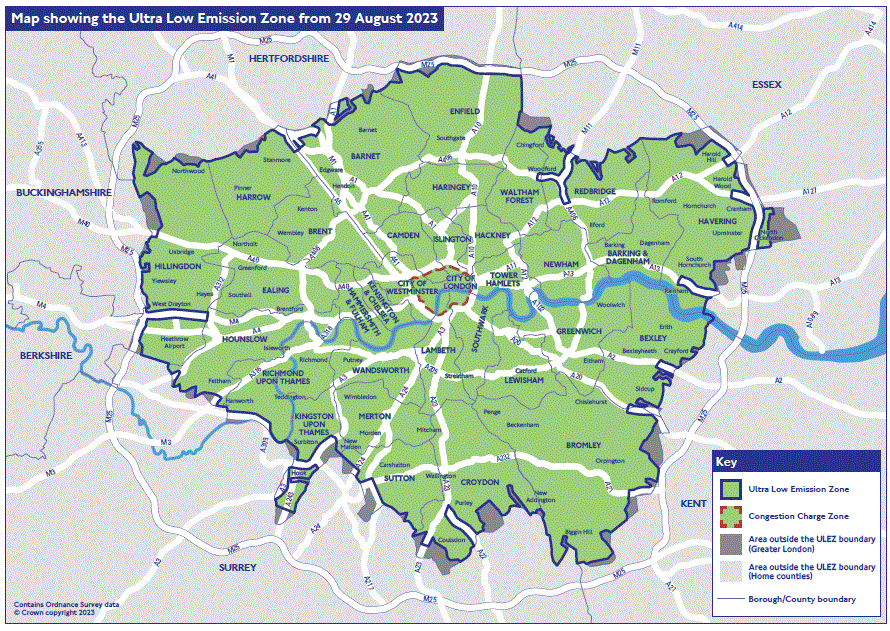In a significant move to tackle air pollution and climate change, London has expanded its Ultra Low Emission Zone (ULEZ) to encompass all of its boroughs. This expansion, which recently came into effect, forms part of a broader clean-air initiative aimed at improving air quality and reducing emissions in the UK’s capital. In this article, we’ll delve into the details of the ULEZ expansion, its repercussions for Londoners, and its broader implications for clean air policies.
The ULEZ Expansion
The expanded ULEZ now requires drivers of non-compliant vehicles to pay a daily charge of £12.50 when traveling within the designated zone. This bold move is designed to incentivize the use of eco-friendly vehicles and curb harmful emissions. Notably, Londoners can still benefit from a £160 million scrappage scheme, offering up to £2,000 per vehicle. The scheme is open to not only individual residents but also small businesses, sole traders, and charities, ensuring inclusivity across the board.
Enforcement and Challenges
To effectively monitor and enforce the ULEZ expansion, Transport for London (TfL) has deployed a network of 2,750 cameras throughout outer London. As of mid-August, nearly 70% of these cameras had been installed. However, this ambitious rollout has faced its share of challenges, with the Metropolitan Police reporting numerous incidents of criminal damage to these cameras, including vandalism and theft. Despite these setbacks, TfL remains committed to upholding the expansion.
Christina Calderato, TfL’s director of transport strategy and policy, has encouraged drivers to register for an Auto Pay account on TfL’s website. This seamless system automatically charges drivers, ensuring they never receive a penalty charge notice (PCN). Drivers of non-compliant vehicles must pay the £12.50 charge online or by phone within three days of travel. Failure to do so results in a penalty of £180, which decreases to £90 if paid within 14 days.
Diverse Opinions Among Londoners
The ULEZ expansion has elicited a range of responses from London residents. Some, like Steve Allen, express concerns about the cost of compliance and the scheme’s implementation. Mr. Allen’s wife, who owns a non-compliant vehicle, has opted to pay the daily charge but criticizes the management of the program by TfL and local councils.
On the other hand, supporters like an anonymous woman in Bromley emphasize the urgency of addressing climate change and view the ULEZ expansion as a crucial step forward. She sees it as part of a comprehensive strategy to combat environmental challenges.
Political and Public Reactions
The ULEZ expansion has not been without its share of political and public opposition. Prime Minister Rishi Sunak has expressed concerns about the financial impact on working families, and members of Mayor Sadiq Khan’s own party initially hesitated to support the policy. Additionally, Conservative councils challenged the policy in the High Court but ultimately lost the case.
Clean air activist Rosamund Adoo-Kissi-Debrah, whose daughter’s death was attributed to air pollution, supports the ULEZ expansion but also emphasizes the need for government contributions to the scrappage scheme to ensure its benefits reach lower-income families. The Conservative mayoral candidate Susan Hall has pledged to reverse the ULEZ expansion if elected in May 2024.
The expansion of London’s ULEZ represents a bold step toward addressing air pollution and climate change in one of the world’s major cities. While it has faced opposition and challenges, it underscores a commitment to creating a cleaner and more sustainable environment for all Londoners. As the ULEZ continues to evolve, its impact on air quality and emissions reduction will be closely monitored, serving as a potential model for similar initiatives in urban areas worldwide.

